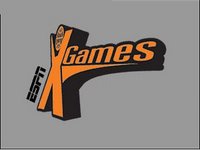"A GAMES" and "X GAMES" Not Confusingly Similar, Says TTAB
In the latest round of the "T GAMES" ("T" for trademark), Applicant Kurt Luttermoser survived Opposer ESPN's challenge to his registration of the mark A GAMES ["GAMES" disclaimed] for entertainment services in the nature of various live, aggressive sporting events. ESPN claimed likelihood of confusion with, suggestion of a false connection with, and dilution of, its mark X GAMES, registered and used for its own sports competitions. ESPN, Inc. v. Luttermoser, Opposition No. 91158096 (July 7, 2006) [not citable].

The Board first noted that the respective services of the parties are legally identical and would be offered through the same trade channels.
As to the purported fame of ESPN's mark, the Board was not convinced. Although ESPN has used its X GAMES mark for ten years, it failed to provide proper evidence regarding the income it earned or the attendance at and viewership of its X GAMES. Moreover, its advertising figures of "several million annually" are not at the level "normally found in connection with famous marks." Nor was there evidence of "public acclaim or of awards given to X GAMES broadcasts." The Board concluded that, although the evidence established that X GAMES is "well known in the action sports field, it fails to establish that the mark is a famous mark that should be accorded a wide scope of protection." Thus the Board considered this fifth duPont factor to be "neutral."
From there, it was all downhill for ESPN. The Board turned to the "key" factor in this case: the dissimilarity of the marks. ESPN relied "heavily" on the testimony of a Duke University professor, who asserted that there "is a high degree of similarity in several dimensions between the two words or these two marks." He noted that the marks "have identical phonemes at the end and virtually identical phonemes at the beginning," and he claimed that because of the shared use of the term "games," the marks are identical in meaning. The Board, however, found the professor's testimony of "no probative value," citing Quaker Oats Co. v. St. Joe Processing Co., 109 USPQ 390, 391 (CCPA 1956):
"[expert] testimony amounts to nothing more than an expression of opinion by the witness, which obviously is not binding upon either the tribunals of the Patent Office or the courts. (citations omitted). If such testimony were adopted without considering other aspects of the case, the effect would be to substitute the opinion of the witnesses for the ultimate decision to be reached by the Court and therefore would be improper."
The Board noted that the first part of the marks, which is the part "most likely to be impressed upon the mind of a purchaser and remembered," are different. As to meaning, "X" is likely to be viewed as suggesting "extreme." "A," on the other hand, "is likely to suggest 'adrenalin(e)' if used with 'Adrenalin Games Festival' or perhaps 'alternative,' 'action,' 'amateur,' and 'athlete.'" Moreover, the word "games" is, at a minimum, descriptive of these services.
The Board concluded that the dissimilarity of the marks "outweighs all other relevant duPont factors."
As to ESPN's Section 2(a) false connection claim and its dilution claim, those two were quickly eliminated from the competition. ESPN failed to prove that A GAMES is the same as or a close approximation of X GAMES, as required for a Section 2(a) violation. The dilution claim crashed out because ESPN obviously failed to prove that the marks are identical or substantially similar.
Text Copyright John L. Welch 2006.




0 Comments:
Post a Comment
<< Home